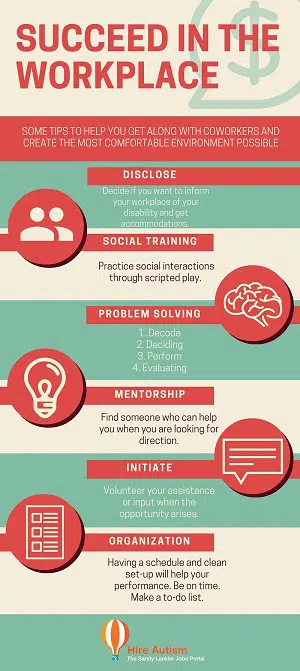How can I get along in my place of work?
An important part of doing well at work is interacting with others and adapting to the work culture. This page is designed to help you navigate the workplace and effectively interact with your co-workers. Below are tips for transitioning into a job and understanding those around you. You can also check out our Maintaining Long Term Employment page for more information.
Disclosure vs. non-disclosure
Making information about an individual’s disability known is called disclosure. Choosing whether or not to disclose one’s disability is a personal decision you must make on your own. Choosing to disclose to your employer will allow you to request any accommodations that you may need.
If you are applying through this website, employers using the site and their hiring team will know you are on the autism spectrum. However, it does not mean that your ultimate supervisor or co-workers will know unless you choose to further disclose to them.
Social training using instructions and role-playing
The use of scripted practice interactions (simulations) in a controlled environment can help you develop your social skills at work
Practice social skills by videoing interactions and reviewing them to find ways to improve
Self-Management Techniques
– Checklists
– Picture prompts
Four-Stage Problem-Solving Approach:
- “Decoding” – Identify what is going on
- “Deciding” – Consider the options and select the most appropriate action for the situation at hand
- “Performing” – Carry out said action
- “Evaluating” – Review the outcome and take anything you’ve learned into account in future interactions.
Healthy Working Relationship
Talk with your coworkers about appropriate topics to create a friendly work environment. Some examples include:
- Weather
- Sports or pop culture
- Hobbies
- Pets
Mentorship
Try to identify an individual you can go to for help and direction, preferably a supervisor or someone who is usually available. If you are ever unsure of what to do or need some feedback, you should feel comfortable approaching this person for assistance.
Initiative
Simply put, initiative means volunteering your assistance or input when the opportunity arises and doing things of your own volition, rather than only doing what you are told to do. Employers will not always mention this and may assume you will know to do so. As a result, some only discover the importance of initiative after the fact. Use discretion and remember to always ask for clarification, but if you see a chance to help someone at the office and they seem amenable to it, then take action. For example, offer to carry something another employee is struggling with.
Surroundings and Social Cues
If you are unsure of how to act, it may help to observe your co-workers and how they behave. Use discretion and do not simply copy what they do, but instead try to get a feel for the way things operate. This is also good practice for how to dress at your new job.
Email Etiquette
Use a greeting line in your emails (“Hello [Name]”, “Good morning”, etc.) and always have an email signature with your first and last name, your position and company name, and how to get in touch with you at work (phone and fax number).
Above all, try to be respectful and polite at work and do your job well.
Quick Tips for Succeeding in the Workplace
- Be on time! Punctuality is key
- Dress appropriately
- Keep conversation and conduct professional
- Maintain daily or weekly to-do lists
- Be open about any accommodations you need
- Do your job well
- Be positive
- Keep your voice down when having conversations, especially if other individuals are working nearby
- Greet people when you arrive and say goodbye when you leave



